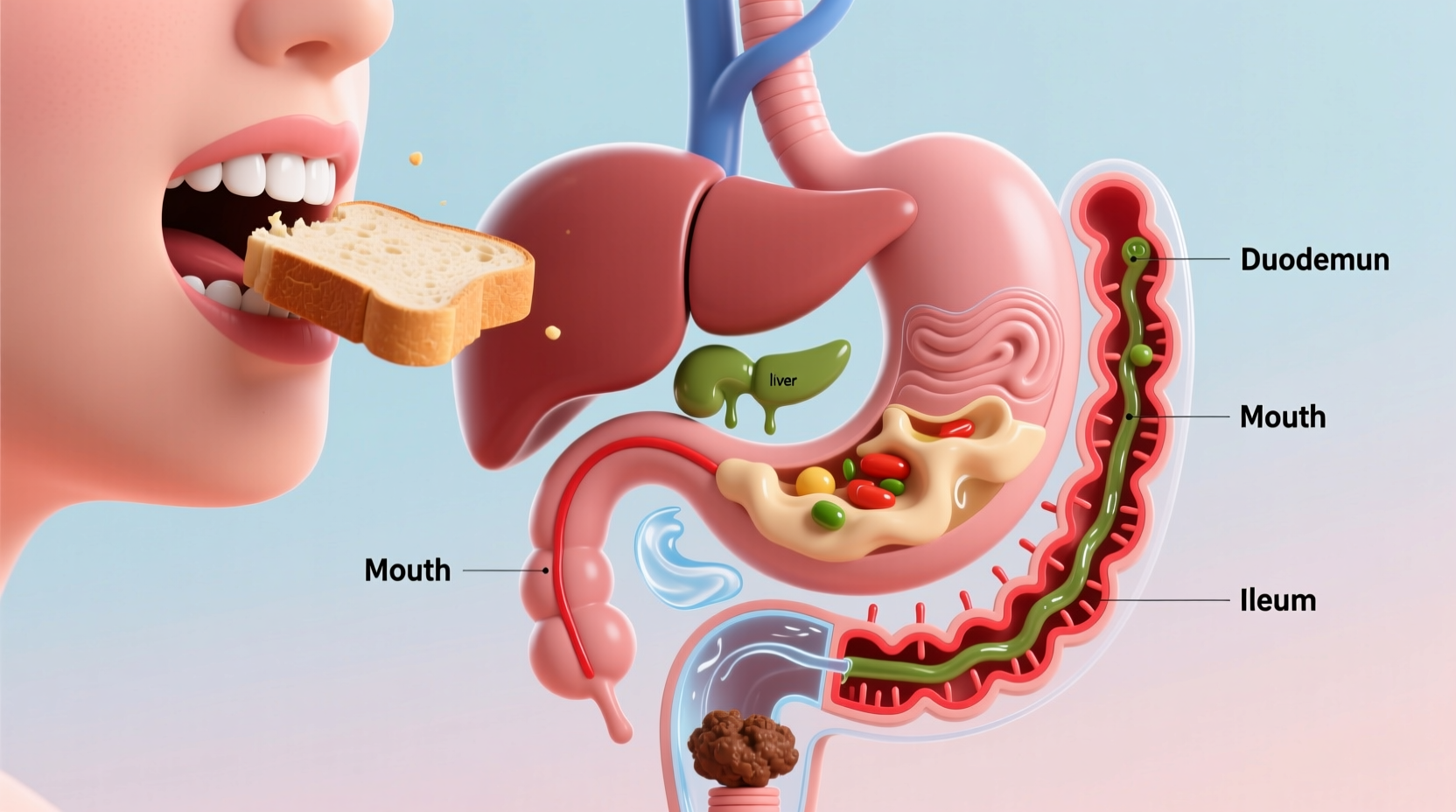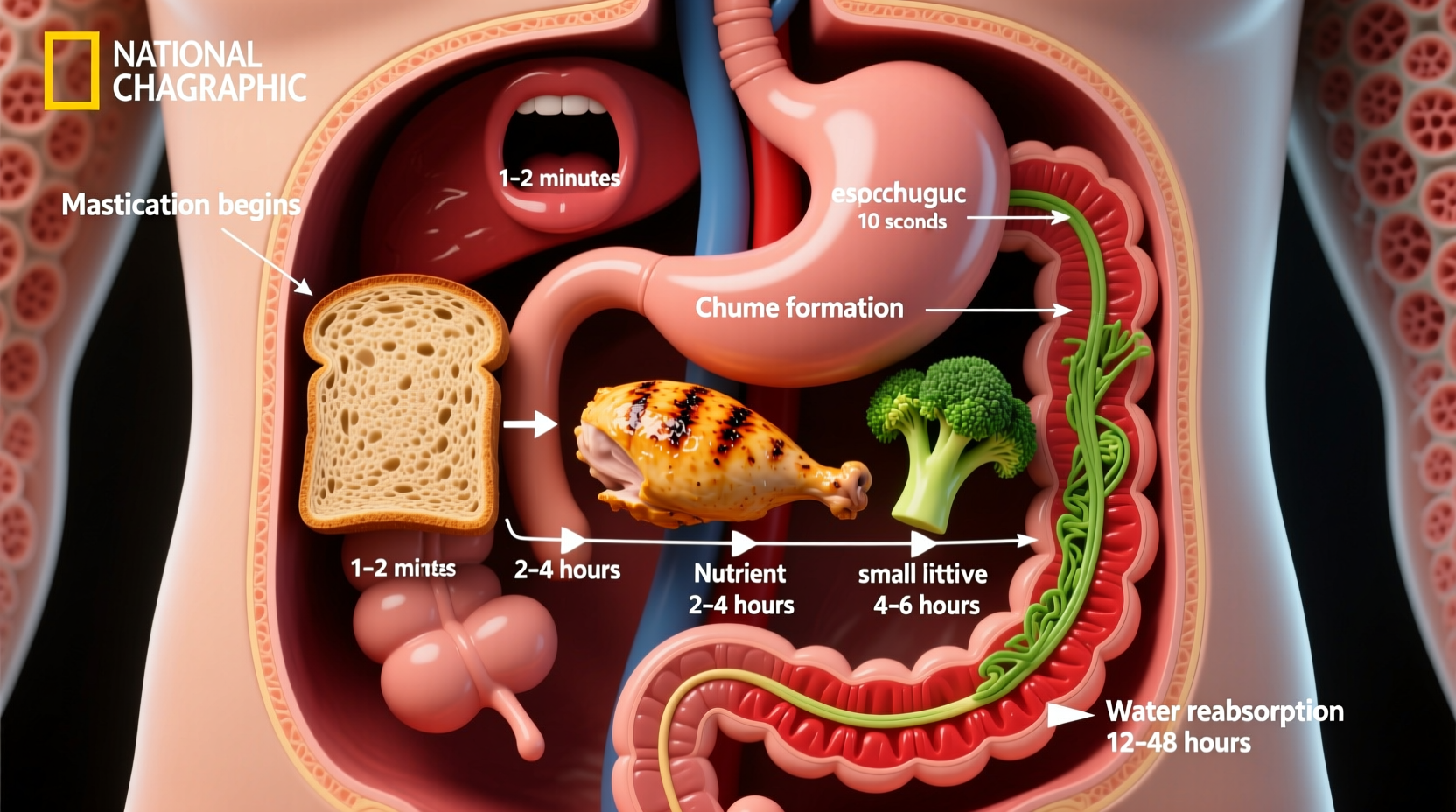Most foods take 24-72 hours to fully digest, with specific components moving through your system at different rates: liquids exit the stomach in 20-30 minutes, carbohydrates take 30-60 minutes, proteins require 3-4 hours, and fats can take 6+ hours to leave the stomach. The entire digestive journey from mouth to elimination typically spans 30-40 hours for adults with healthy digestive systems.
Ever wonder why you still feel full hours after a big meal, or why certain foods seem to digest faster than others? Understanding digestion timing isn't just academic curiosity—it directly impacts how you plan meals, manage energy levels, and address digestive discomfort. This guide delivers science-backed insights you can apply immediately to optimize your digestive health.
The Digestive Journey: A Step-by-Step Timeline
Your food embarks on a complex journey through multiple digestive stages. Let's follow what happens after your first bite:
Stage 1: The Mouth (0-1 minute)
Chewing mechanically breaks down food while saliva introduces amylase enzymes that begin carbohydrate digestion. Proper chewing significantly impacts later digestion speed—under-chewed food creates extra work for your stomach.
Stage 2: The Stomach (20 minutes to 6 hours)
This muscular organ mixes food with gastric juices through rhythmic contractions. Digestion time here varies dramatically by food type:
| Food Type | Stomach Emptying Time | Primary Digestive Process |
|---|---|---|
| Water & Clear Liquids | 20-30 minutes | Minimal processing, rapid absorption |
| Simple Carbohydrates (fruit, juice) | 30-60 minutes | Continued carbohydrate breakdown |
| Proteins (meat, eggs) | 3-4 hours | Pepsin breaks proteins into peptides |
| Fats & Complex Meals | 4-6+ hours | Lipase enzymes break down fats |
According to the National Institute of Diabetes and Digestive and Kidney Diseases (NIDDK), your stomach signals fullness to your brain during this phase, which is why eating slowly prevents overeating—your brain needs 20 minutes to register satiety.
Stage 3: The Small Intestine (2-6 hours)
Nutrient absorption happens primarily here. As Mayo Clinic researchers explain, bile from your liver and enzymes from your pancreas further break down food while villi absorb nutrients into your bloodstream. Complex carbohydrates and proteins complete their breakdown here.
Stage 4: The Large Intestine (16-40 hours)
Water and electrolytes get reabsorbed while gut bacteria ferment undigested fibers. The Johns Hopkins Medicine notes this fermentation produces beneficial short-chain fatty acids that support gut health. What remains becomes stool.
Why Digestion Times Vary: 5 Key Factors
Your personal digestion speed depends on multiple variables beyond just food type:
1. Meal Composition Matters Most
A plate of steak with buttered potatoes (high fat + protein) will take significantly longer than watermelon (mostly water + simple carbs). The American Journal of Clinical Nutrition confirms mixed meals digest slower than single-component foods due to sequential digestive processes.
2. Your Unique Gut Microbiome
Research published in Nature shows individuals with diverse gut bacteria digest fibers more efficiently. Those with lower microbial diversity may experience slower transit times.
3. Hydration Status
Water facilitates every digestive stage—from saliva production to stool formation. The European Food Safety Authority notes that inadequate fluid intake slows peristalsis, potentially extending digestion by 12+ hours.
4. Physical Activity Level
Gentle movement after meals stimulates intestinal contractions. A Journal of Gastroenterology study found that 15 minutes of walking after eating reduced gastric emptying time by 29% compared to sedentary behavior.
5. Age and Health Conditions
Digestive efficiency naturally declines with age. The World Journal of Gastroenterology reports adults over 65 experience 30-50% slower gastric emptying than younger adults. Conditions like diabetes or IBS further alter digestion timelines.
Recognizing Healthy Digestion vs. Warning Signs
While digestion times vary, certain patterns indicate healthy function:
- Regular elimination: 1-3 bowel movements daily with well-formed stool
- No persistent discomfort: Occasional gas is normal; constant bloating isn't
- Consistent energy: No crashes 2-3 hours after meals
- Normal transit time: Food-to-stool passage within 24-72 hours
Consult a healthcare provider if you experience:
- Consistent diarrhea or constipation lasting over 2 weeks
- Severe abdominal pain with meals
- Unexplained weight loss with normal eating
- Blood in stool
4 Science-Backed Strategies to Optimize Digestion
These evidence-based approaches support healthy digestion without drastic lifestyle changes:
1. Sequence Your Meals Strategically
Start meals with vegetables or salad—fiber-rich foods eaten first slow glucose absorption. A Nutrients journal study found this approach reduced post-meal blood sugar spikes by 74% compared to eating carbs first.
2. Chew Thoroughly (25-30 times per bite)
Proper mastication reduces stomach workload. Research in the American Journal of Clinical Nutrition shows thorough chewing increases nutrient absorption by 47% and reduces digestive discomfort.
3. Time Your Water Intake Wisely
Drink water 30 minutes before meals rather than during. The Journal of Clinical Gastroenterology notes excessive fluids during meals can dilute stomach acid, potentially slowing protein digestion by up to 30%.
4. Incorporate Digestive-Enhancing Foods
Add these science-supported options to your diet:
- Ginger: Stimulates gastric motility (per European Review for Medical and Pharmacological Sciences)
- Pineapple: Contains bromelain enzyme that breaks down proteins
- Yogurt with live cultures: Supports gut microbiome diversity

Common Digestion Myths Debunked
Let's clarify some widespread misconceptions with evidence-based facts:
Myth: Food rots in your stomach if not digested quickly
Truth: Your stomach's acidic environment (pH 1.5-3.5) prevents bacterial growth that causes rotting. Undigested food passes to the intestines rather than decomposing.
Myth: Digestion stops during sleep
Truth: Peristalsis continues throughout sleep—your digestive system never fully shuts down. The World Journal of Gastroenterology confirms gastric emptying proceeds at 60-70% of daytime rates during sleep.
Myth: All fiber speeds digestion equally
Truth: Soluble fiber (oats, apples) slows gastric emptying for steadier energy, while insoluble fiber (wheat bran, vegetables) speeds intestinal transit. Both are essential but function differently.
When to Consult a Professional
While occasional digestive variations are normal, seek medical advice if you experience:
- Consistent symptoms lasting more than 2 weeks
- Unintentional weight loss
- Severe pain that disrupts daily activities
- Blood in vomit or stool
A gastroenterologist can perform tests like gastric emptying studies or endoscopy to identify underlying issues. Early intervention often prevents complications with conditions like gastroparesis or inflammatory bowel disease.











 浙公网安备
33010002000092号
浙公网安备
33010002000092号 浙B2-20120091-4
浙B2-20120091-4